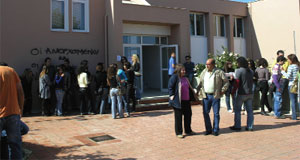Το κείμενο αυτό μας έρχεται από τη δεκαετία του 1960 και εξετάζει την ανάπτυξη και τις αντιφάσεις του φιλελεύθερου πανεπιστημίου στην Αγγλία και του ρόλου του φοιτητικού κινήματος σε αυτόν, γεγονός που το καθιστά επίκαιρο στη σημερινή συγκυρία. Εξαιρετικά ενδιαφέρον! Society as a school and school as society.!!!
THE 1960s sees the birth of a new political generation in the advanced capitalist countries. Its school is the student movement. In Germany, Japan, America, France and Italy, combative student movements, born of explosive social tensions close below the surface of post-war affluence and political quietude, are demonstrating the vulnerability of advanced bourgeois society. Britain until recently appeared immune from such developments, although here too events of the past year pose the question as to the possible birth of a student movement. This essay is an exploration of that possibility. The focus is limited to the question of the actual basis for such a movement in the educational system itself.
What is historically distinctive about the student movements of today is their involvement, centrally, in politically contesting the established university structure and practice. This political contestation on a global scale is emerging during a decade of rapid and spectacular growth in higher education in the advanced capitalist nations. The connection between university expansion and student agitation and protest needs exploring, for the two are intimately related and each is revelatory of the other. In the process of expansion, in one country after another, traditional educational values and practices are subject to general questioning and the old university system is attacked from within and from without. This much is generally accepted, but what requires to be understood is the essential nature of the crisis that now manifests itself. It is a crisis embracing both teachers and students. Increasing numbers become conscious of it, as more and more experience the confusion and uncertainty now pervading academic work and study.
In Britain the active propagation of specifically student demands is a new phenomenon and precipitates an immediate response. The student "revolutions" at Hornsey and Guildford in June 1968 led to swift and far-sweeping action on the part of the local authorities concerned: students were expelled, teachers sacked and whole departments disbanded. At the London School of Economics the authorities, if somewhat less direct and primitive in their methods, are no less repressive; informing by teachers on students, erecting iron gates to forestall student occupations, requesting police intervention, issuing writs to selected militant students and threatening staff with disciplinary action and dismissal. Such repression accompanies the "concessions" recently negotiated by the National Union of Students with the Committee of Vice-Chance1lors.l The pattern is clear : where an increase in student representation in the on-going administering of the college fails to contain student unrest the State will step in. Parliament and press now speak with one voice of the need to crush student action at its inception.



















